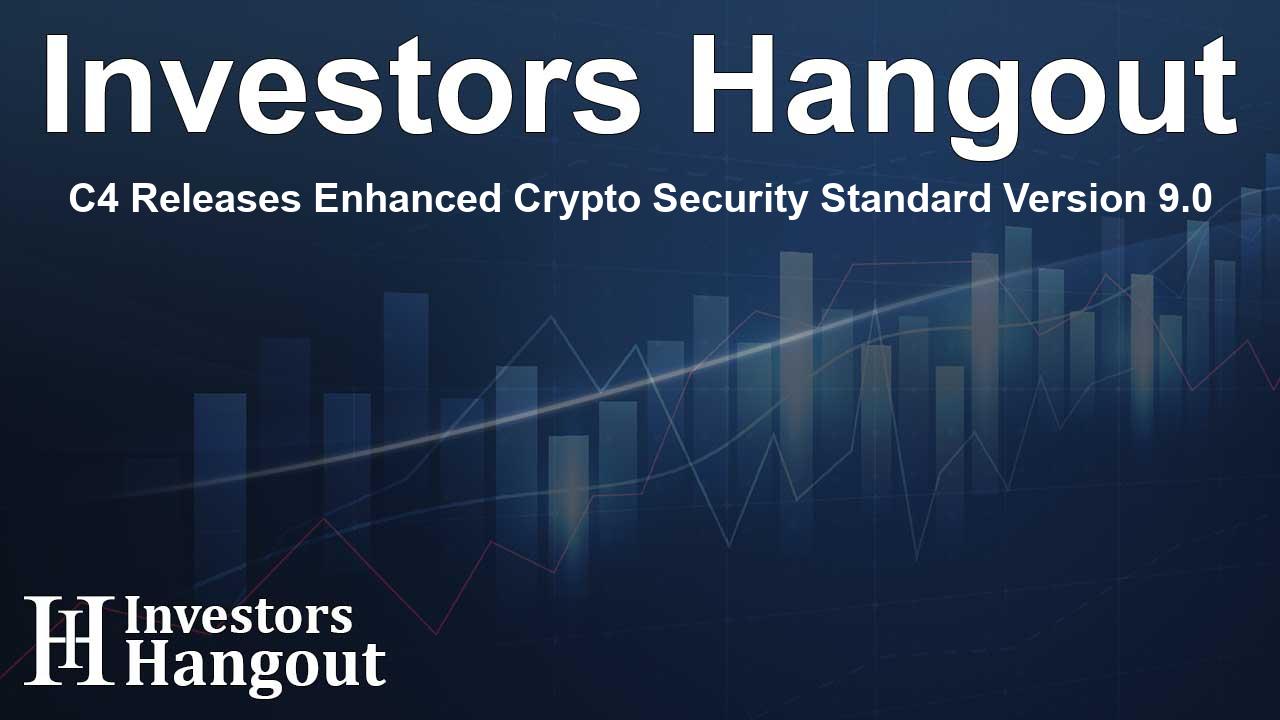C4 Releases Enhanced Crypto Security Standard Version 9.0

C4 Releases Enhanced Crypto Security Standard Version 9.0
The CryptoCurrency Certification Consortium (C4), an influential nonprofit organization, has unveiled Version 9.0 of the CryptoCurrency Security Standard (CCSS). This update signifies a crucial advancement in safeguarding cryptocurrency systems, particularly in managing private keys. Given the alarming increase in cyberattacks targeting private keys, the urgency for a robust, community-driven standard has never been greater.
Importance of Community Collaboration
Since its inception in 2015, the CCSS has flourished through the collaboration of dedicated professionals within the cryptocurrency community. This collective effort ensures the Standard remains unbiased and free from commercial control, allowing it to focus on enhancing security in the cryptocurrency sphere.
Voices from the Industry
Jameson Lopp, Co-founder and Chief Security Officer at Casa, emphasized, "The collaborative nature of the CCSS is key to its ongoing success. The contributors to the standard possess no personal stakes in promoting specific companies or products, making the Standard an objective reference for security best practices." This insight underscores the importance of community-driven efforts in maintaining security standards.
Private Key Management: A Critical Issue
Private keys form the backbone of cryptocurrency security; any compromise can lead to irrevocable financial loss. Despite advancements in blockchain technologies, inadequate management of private keys—stemming from poor storage, unauthorized access, and lack of secure custodial services—has resulted in massive breaches, costing the industry billions and eroding user trust in digital currencies.
Industry Perspectives
As Jessica Levesque, Executive Director at C4, pointed out, "Private key management is critical to the survival and growth of the cryptocurrency industry. The release of CCSS Version 9.0 highlights the necessity of keeping security standards updated. When private keys are compromised, the consequences are irreversible, so it’s vital for our expert community to refine best practices continuously."
Updates to CCSS Version 9.0
The latest iteration, CCSS Version 9.0, brings crucial updates intended to maintain a focus on community leadership. Among these updates are enhancements to the clarity of existing requirements, the introduction of new features to combat emerging security challenges, and provisions for single-signer mechanisms, among others. The updated Standard is accessible through various documentation channels that promote transparency and ongoing education.
Expert Review Committee
The CCSS is overseen by a distinguished Steering Committee composed of leading experts and blockchain professionals globally, who ensure the Standard's evolution effectively addresses new vulnerabilities. Notably, this committee operates independently from any corporate influence, dedicating their efforts solely to advancing security within the cryptocurrency sector.
The Evolving Nature of Security
As the cryptocurrency landscape expands and transforms, the standards protecting it must also adapt. The CCSS plays an integral role in ensuring that users' assets and their trust remain unshaken, fostering a safe environment for global cryptocurrency adoption.
Community Involvement and Contribution
Participation in enhancing the CCSS is not limited to industry veterans; it is open to anyone interested in contributing and incurs no costs. The C4 encourages individuals to engage in shaping the community's security practices.
About C4
The CryptoCurrency Certification Consortium is committed to upholding security standards within the cryptocurrency realm. Through initiatives focused on education, certification, and collaborative efforts, C4 aims to promote responsible development and usage of blockchain technology.
Frequently Asked Questions
What is the CryptoCurrency Security Standard (CCSS)?
The CCSS is a set of guidelines designed to enhance security practices in the cryptocurrency industry, particularly in managing private keys.
What are the key updates in Version 9.0 of the CCSS?
Version 9.0 includes clarifications of requirements, new security provisions, and support for single-signer mechanisms to address emerging threats.
Who can contribute to the CCSS?
Anyone interested in improving cryptocurrency security can contribute to the CCSS, and there are no fees associated with participation.
Why is private key management so critical?
Private keys are essential for accessing and managing cryptocurrency assets; their compromise can result in irreversible financial losses.
How does the CCSS ensure objectivity in its updates?
The CCSS is developed and maintained through community collaboration, free from corporate influence, ensuring that updates focus on security rather than commercial interests.
About Investors Hangout
Investors Hangout is a leading online stock forum for financial discussion and learning, offering a wide range of free tools and resources. It draws in traders of all levels, who exchange market knowledge, investigate trading tactics, and keep an eye on industry developments in real time. Featuring financial articles, stock message boards, quotes, charts, company profiles, and live news updates. Through cooperative learning and a wealth of informational resources, it helps users from novices creating their first portfolios to experts honing their techniques. Join Investors Hangout today: https://investorshangout.com/
Disclaimer: The content of this article is solely for general informational purposes only; it does not represent legal, financial, or investment advice. Investors Hangout does not offer financial advice; the author is not a licensed financial advisor. Consult a qualified advisor before making any financial or investment decisions based on this article. The author's interpretation of publicly available data shapes the opinions presented here; as a result, they should not be taken as advice to purchase, sell, or hold any securities mentioned or any other investments. The author does not guarantee the accuracy, completeness, or timeliness of any material, providing it "as is." Information and market conditions may change; past performance is not indicative of future outcomes. If any of the material offered here is inaccurate, please contact us for corrections.